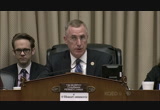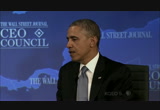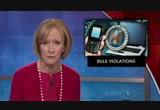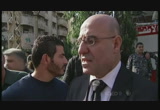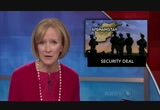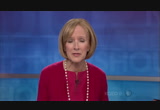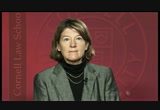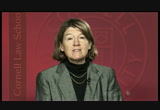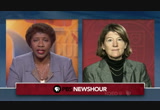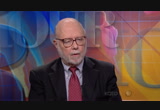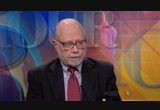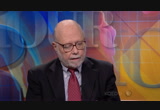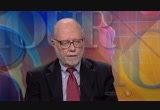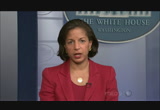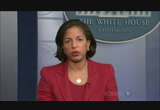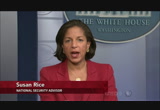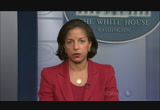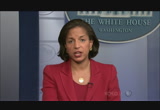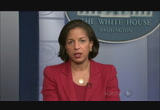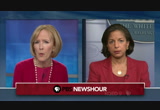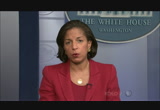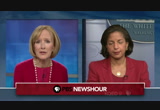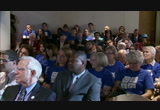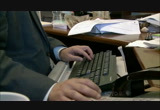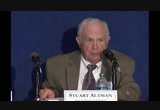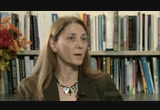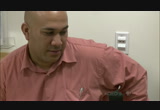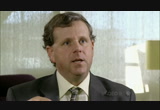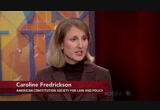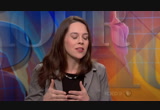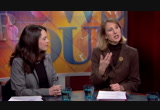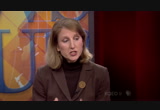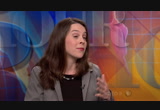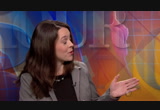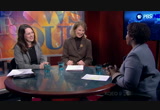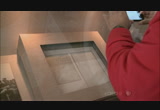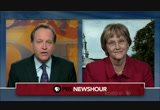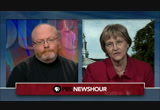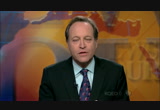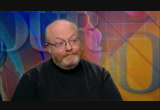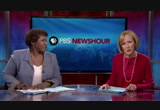tv PBS News Hour PBS November 19, 2013 3:00pm-4:01pm PST
3:00 pm
captioning sponsored by macneil/lehrer productions >> ifill: j.p. morgan chase agreed to a record settlement with the justice department today over mortgage practices that drove the financial crisis. the price tag: $13 billion. good evening. i'm gwen ifill. >> woodruff: and i'm judy woodruff. also ahead this tuesday, president obama personally appealed to senators to hold off on additional sanctions on iran. we have an exclusive interview with white house national security adviser susan rice. >> ifill: and we remember one of american history's most revered speeches delivered four score and 70 years ago today, abraham lincoln's gettysburg address. >> the speech is powerful in
3:01 pm
part, i think, because it is so direct and so poetic, and the words carry so much meaning in such a short space. >> ifill: those are just some of the stories we're covering on tonight's pbs newshour. >> major funding for the pbs newshour has been provided by: ♪ ♪ moving our economy for 160 years. bnsf, the engine that connects us. >> and the william and flora hewlett foundation, working to solve social and environmental problems at home and around the world.
3:02 pm
>> and with the ongoing support of these institutions and foundations. and... >> this program was made possible by the corporation for public broadcasting. and by contributions to your pbs station from viewers like you. thank you. >> woodruff: the nation's largest bank admitted today that it misrepresented mortgage- backed securities that collapsed in the 2008 crash. with that, j.p. morgan chase agreed to pay $13 billion, the largest settlement ever between a private company and the government. we'll hear much more on the details of the settlement right after the news summary. the problems with the healthcare.gov web site got a new going over today in congress. newshour congressional correspondent kwame holman reports. >> reporter: the law came under fresh fire at the capitol, with the latest news accounts
3:03 pm
providing the ammunition. the "washington post" reported private consultants warned in march there were serious risks healthcare.gov would not be ready for its october rollout. republicans seized on the document at a house hearing. louisiana's steve scalise called it "damning." >> if the president really didn't know about this... this report says the white house absolutely knew what was going on, and they didn't tell the president. he ought to be firing these people today. >> reporter: administration officials said they took action after the report. but henry chao, the top technology officer at medicare, said he was not briefed on the consultants' findings. pennsylvania republican tim murphy pressed the point. >> and so, this is a major report that went as high up as the secretary-- we don't know-- saying that there were serious problems with this. and you're saying that even though you were interviewed by this, you did not ever have this
3:04 pm
briefing yourself? >> no, i didn't. >> reporter: chao did say 30% to 40% of the system that supports the online exchange still needs to be developed and tested. at a separate hearing, one private security expert warned the healthcare web site has flaws that put consumer data at "critical risk," but white house spokesman jay carney insisted today the information people give is safe. >> the privacy and security of consumers' personal information are a top priority. when consumers fill out their online marketplace applications, they can trust that the information that they are providing is protected by stringent security standards. >> reporter: meanwhile, house republicans pressed for senate democrats to take up a bill that lets millions of americans keep their existing insurance plans. later, at a business forum, president obama acknowledged the challenge his health care program now faces. >> we are going to have to: a, fix the web site so that everybody feels confident about that. we're going to have to obviously remarket and rebrand, and that will be challenging in this
3:05 pm
political environment. >> reporter: all of that as the latest "washington post"/abc news poll found the president's approval ratings and support for the health care law have reached new lows. >> woodruff: a freshman member of the u.s. house was charged today with m.d. cocaine possession. according to court documents, the republican from florida was arrested on october 29 in washington. if convicted, he faces up to six months in jail and a one thousand dollar fine. this evening, the former t.v. anchor and radio talk show host said he is profoundly sorry and that he has struggled with alcoholism people younger than 21 won't be able to buy cigarettes or other tobacco products in new york city anymore. mayor michael bloomberg signed legislation today making new york the first major american city to make 21 the cutoff age for tobacco. bloomberg said it's outrageous for cigarette companies and convenience stores to oppose the law.
3:06 pm
>> this century, a billion people will die from smoking around the world, and we don't want any of the people who die to be new yorkers. that's the one thing we can do. and the people that try to change the argument to an economic one really ought to look in the mirror and be ashamed. >> woodruff: the ban does have its limitations-- teenagers will still be able to possess tobacco but not buy it. it turns out the national security agency has violated surveillance limits numerous times. the obama administration released a stack of heavily censored documents overnight showing repeated violations and repeated promises to do better. today, the chief lawyer for the director of national intelligence blamed complicated technology that amasses vast amounts of information. a pair of suicide bombings in lebanon killed 23 people today and wounded nearly 150 others outside iran's embassy in beirut.
3:07 pm
it was the latest sign that the civil war next door in syria is spilling over. we have a report from lindsey hilsum of independent television news. be advised: some of the images may be disturbing. >> reporter: the iranian embassy was the target, but damage from this morning's attack spread across the neighborhood. the first blast killed the suicide bomber and possibly embassy guards, but it was the huge car bomb a few minutes later that killed and injured so many people. some were hurt because they came out onto their balconies after the first blast to see what had happened; others because they rushed to the scene to try to help people. >> ( translated ): we work near here. first, i heard a small explosion near the iranian embassy. it looked like a suicide bomb. he blew himself up in front of the security. i went to help a guy there, and, within seconds, just ten meters away, i saw a car exploding. there were many injured and martyrs, so we started to help them.
3:08 pm
>> reporter: such a huge blast conjures terrible memories of the civil war here in beirut in the 1980s when bombs and attacks were a daily occurrence. but worse than that, people here fear that lebanon is becoming the new frontline in the war in syria. this is a largely hezbollah area. the young men hanging around are militants loyal to the shi'a group that has sent fighters to support president assad across the border. >> ( translated ): we can't separate what happens in syria from what happens in lebanon. this blast today contains not only a military but also a political message, because the syrian army is winning on the battlefield. it's also because of the iranian position on syria. >> reporter: today's bomb points up what everyone here knows: lebanon's peace is in peril.
3:09 pm
the country's divisions mirror those in syria, and the war next door is a growing threat to this fractured, fragile state. >> woodruff: in syria, state tv reported the army recaptured a key town along a route linking damascus to the coast. the village of qarah lies near the lebanese border. its capture closes off an arms smuggling route used by rebels. the town's capture follows recent army advances around aleppo and damascus. there's conflicting news on whether the u.s. and afghanistan are close to a security agreement. the office of afghan president karzai said today they've agreed on a framework to govern any u.s. troops who stay on after 2014, but the u.s. state department said: "we are not there yet." a meeting of afghan elders convenes thursday to consider a possible agreement. president obama met with senators of both parties today
3:10 pm
not to push new sanctions on iran just yet. they met at the white house, a day before negotiations on iran's nuclear program resume in geneva. republican senator bob corker of tennessee said the president asked them to pause for "a period of time." corker said that seemed likely, at least for a few days. >> >> you can talk about what-ifs, but i think one thing that is for sure will be is no amendments that will pass the united states senate, for sure, relative to this, anyway, until we come back from thanksgiving. >> woodruff: later, the said he's not sure if nuclear talks with iran will yeld an agreement but iran's foreign minister says he think there is's every possibility of working out a deal in geneva. recovery efforts began in earnest in the midwest today after sunday's barrage of tornadoes and thunderstorms. early estimates indicated damages could total $1 billion. today, people combed through wreckage in washington,
3:11 pm
illinois, where hundreds of homes were flattened, and crews across the region worked to restore power to more than 320,000 customers. the cost of typhoon recovery in the philippines could come close to $6 billion. a government official estimated today that that is what is needed to rebuild homes, schools, roads and bridges. meanwhile, much-needed supplies continued to arrive from countries around the world. the u.s. has now provided $37 million in humanitarian aid. wall street edged lower today. the dow jones industrial average lost nearly nine points to close at 15,967. the nasdaq fell 17 points to close at 3,931. >> woodruff: still ahead on the newshour: the big deal over bad mortgages; susan rice on talks with iran; curbing the cost of health care in massachusetts; what judicial gridlock means for the federal courts; and the
3:12 pm
legacy of lincoln's most famous speech. >> ifill: j.p. morgan's $13 billion settlement brings months of delicate, high stakes negotiations to an end. under the terms of the deal, $4 billion will go to struggling homeowners in the form of reduced mortgage payments, lower loan rates and other assistance, $7 billion will go to investors as compensation; the remainder will be fines paid by the bank. the agreement comes as investigators are said to be pursuing cases against other financial institutions. some assessment now of the deal's significance and its problems. lynn stout is a professor of business law at cornell university. she closely watches financial regulation. and bert ely is a banking consultant. what's your first sense of this
3:13 pm
deal? was it a good deal for anybody? >> well, i think as much as anything else it gets these problems behind jane morgan chase. they had a tentative deal a few weeks ago but now they can get this behind them and move on with their business. >> ifill: lynn stout, overall, what do you think? a good deal? >> i think it's a great deal. this is the first time we've seen one of these big banks get hit with consequences large enough to get their attention so it's a real breakthrough in a lot of the ways on the part of the government. >> ifill: let me ask you about this first, lynn stout. in your reading of the agreement does j.p. morgan admit wrongdoing? >> well, they don't admit to criminal wrongdoing directly, but they've agreed to a statement of facts. they've agreed not to dispute what they did and much of it boils down to plain old fraud so that's a major concession that's going to have an effect on their ability to defend themselves against future civil charges by
3:14 pm
other parties. >> ifill: is that your reading of it, too, bert ely? >> i think it's important to realize that a portion of this settlement actually is from actions by bear stearns and washington mutual before they were acquired by j.p. morgan chase. so it's important to realize that j.p. morgan chase and its management is not responsible for the total amount of this problem. >> ifill: but they're also not being excused from that in part of this deal which is what they want, right? >> well, that's true. and as lynn pointed out, there could well be other litigation that grows out of this and that's one of the things we have to see how that plays out. >> ifill: lynn stout, one of the things we lose sight of is exactly how to fix people. so if you are an affected homeowner who got one of these toxic loans sold to them by this bank, do you get any kind of repayment for that? >> well, there's about $4 billion set aside for homeowner relief. that sounds like a big number,
3:15 pm
but the fact is the mortgage market measures in the tens of trillions. so i'm sure there will be some homeowners who will be very glad for a little bit of relief but it's not going to make that much of a difference for most homeowners. the big effect of this settlement is the possibility that it's going to create an incentive for banks to behave better in the future. it's a real message. a real warning. now there's the possibility of real consequences. >> ifill: does this actually make bank think "okay, i'm not going to misbehave because look what happened to jamie dimon" the c.e.o. of j.p. morgan chase? >> it's important to keep in mind these mortgages were originated when we had a bubble in housing prices. there was a tremendous push on to increase homeownership. the regulatory environment was very different then. and at least for the foreseeable future i don't see that problem emerging. maybe ten, 15 years down the road it could again. but in the current environment, this kind of problem is simply not going to emerge.
3:16 pm
>> ifill: lynn stout, you were going to say something to that. >> yeah, i wish i were as optimistic as bert is. but the fact, is they've got real short memories on wall street. i think banks are going to behave better, be more cautious, they're not going to commit these sorts of deceptions for four or five years but we still have basic structural problems. we still have not implemented affected financial reform and i can see us repeating this scenario five, six years down the road. >> ifill: i do have to ask you this question, bert ely. if you are jamie dimon with bank of america, do you feel like this is a sign that business has to be done differently or financial reform is going to be imposed on you? >> well, first of all, an awful lot of financial reform has been imposed in the process of being imposed on the industry as a result of regulations that were authorized by the dodd-frank act a few years ago. and those regulations are being put in place right now and,
3:17 pm
quite frankly, the consequence of these regulations may be to overly tighten the ability of mortgage credit, particularly for those who have less than pristine credit records. and so when you have a situation where a pendulum swings back and forth, right now it is swinging towards possibly excessive restrictiveness. at some point in time it may swing back. but for the short term, i don't see that type of problem emerging. >> ifill: when jamie dimon first went to the department of justice and started to negotiate that, he came to the table and said "how about $3 billion?" and they said "i don't think so." did he lose in the end? >> well, first of all this penalty defined in settlement costs are being ultimately borne by the shareholders of j.p. morgan chase. so i think we have to realize they're the ones that are ultimately paying for this. and, you know, they are going to be suffering some because of this. but the important thing is they get the problem behind them, they can move on and i think that's very important for j.p. morgan chase.
3:18 pm
>> ifill: lynn stout, could the government have gotten more? could it have held out for more than $14 billion? >> oh, you know, possibly in theory. but this is a real breakthrough on the part of the government. we haven't seen anything of this size in terms of consequences imposed on banks. earlier cases have been set settled for amounts in the hundreds of millions. that sounds like a lot but for the most banks it's the cost of doing business. this settlement amounts to almost half of j.p. morgan's profits for 2012 and it's not going to affect the shareholders nearly as deeply as it's going to be knelt the declining bonuses for the employees. that's where the hope lies in changing bank behavior. this is going to affect the bonus pool at j.p. morgan and that will get people's attention. >> ifill: there's still an outstanding criminal investigation which this does not take off the table, right? >> that is correct. this is just a matter of settling civil charges. we don't know how the criminal aspect of this is going to play out.
3:19 pm
>> ifill: and the loon don wail case we heard from, this is separate, to, right? >> that was trading losses and has nothing to do with the mortgage issues addressed here in this settlement. >> ifill: lynn stout, are you satisfied this is a civil agreement and the criminal case is yet to come? >> yeah, i think so. this chapter is not finished for j.p. morgan. there's still the possibility of criminal investigations as part of the settlement the bank has agreed to cooperate in assisting those investigations. they've made admissions to facts that are going to make it easier for other investors who feel they've been defrauded to bring civil action so this is certainly progress but this is by no means over for j.p. morgan >> ifill: lynn scout at cornell, bert ely thank you very much. >> thank you for having me here. >> woodruff: as the u.s. negotiating team readies for the next round of talks in geneva
3:20 pm
over iran's nuclear program, president obama urged senators at the white house today to hold off on seeking additional sanctions on the country. afterwards, six senators-- including democrats charles schumer and bob menendez-- sent a letter to secretary of state john kerry, insisting that the administration not accept an agreement that would be overly generous to iran or not tough enough on its nuclear program. a short time ago, i spoke to white house national security advisor susan rice about today's meeting and the upcoming talks. welcome. and we know that going into this meeting a number of the senators were saying they felt the president was going too easy on iran and an eagerness to get to a deal. did it change any minds snowed >> i think so, judy. there is a two-hour meeting in which the president laid out in great detail the substance of what is, in fact, on the table and explained to the senators
3:21 pm
that this is the deal that serves american interests. and let me explain why. first of all, the president has long been committed to preventing iran from acquire ago nuclear weapon. we have pursued the toughest sanctions regime ever imposed on any country. as a result, the currency has plummeted, their oil sales are down 60% and they have now come to the negotiateing table for the first time in some earnest. the purpose of this deal is to create an interim step. a first step of six months and in that six months iran's nuclear program, all of its progress, will be halted. all of its progress will be halted and in some very key respects the program will be rolled back. at the same time, there will be complete transparency into all aspects of iran's nuclear program so the international community would be able to detect any offer by iran to do anything in violation of its
3:22 pm
international obligation. and that, if i might just add, that is very modest, limited amount of economic relief the is totally reversible and that doesn't affect the sanctions architecture in any way, shape, or form. >> woodruff: how does that square with the senators' concerns in the letter they sent to secretary kerry today that they're saying the iranians stand to benefit billions of dollars from having a loosening of the sanctions and that meanwhile the iranians will be able to continue, centrifuges, they'll be able to continue enriching uranium, albeit at low levels. in other words, they're saying this tradeoff is not a fair one. >> well, first of all, they're saying that if such a deal were cut in their judgment it wouldn't be fair. this is not such a deal. the amount of economic relief we're talking about is a fraction of what iran will continue to lose every month
3:23 pm
because of the ongoing sanctions which will remain in place and continue to be in force. they will gain a bit but lose a lot more. so they're still on a downward path and they're still going to have real economic pressure on them because the oil sanctions, the financial sanctions, all that stuff remains in effect. what they are doing-- which is very significant as a first step it's not the whole game because we're doing this only for six months to see if we can reach a comprehensive solution-- but instead of them talking and talking while they continue making progress on the nuclear program, in this six month period there will be no prospect for them to make any further progress. so whether it comes to installing the centrifuges, accumulating the enriched uranium, all of that will not be possible and indeed key elements of their stockpiles will be reduced. >> woodruff: meanwhile, the senators are still saying they hold out the option of trying to add on sanctions if not right away in the weeks to come.
3:24 pm
my question is how can you negotiate an agreement with iran which this week coming out of these meetings this week where you now have the possibility of new sanctions in the near future. >> well, i think the sanctions -- the current sanctions will remain in effect in any case and the administration fully supports that. we will continue enforcing those sanctions. the question is whether this is the time for the united states congress to impose new sanctions and we think while these negotiations are still going on at this fragile stage and we ought to know in the next few weeks where these negotiations are going to end up. now is not the time for new sanctions. that would find the united states isolated when we now have the international community with us supporting a diplomatic solution. and it will take the pressure off're. now, if the negotiations fail then we can all talk about the prospect of additional sanctions. >> woodruff: i want to turn to
3:25 pm
afghanistan, dr. rice, and this is we know the reports out of kabul today from the karzai government is the that a deal has been reached with the u.s. over what happens to u.s. troops after 2014, a status of forces agreement, to so to speak. the state department is saying there's no such deal. my question to you is are you close and could any deal involve the president in essence apologize for mistakes the u.s. has made in afghanistan? >> let me answer both questions, judy. first of all there's no such discussion of an apology. i'm not sure where the reports come from, quite frankly. so let's take that off the table. that's not in the cards. there is a bilateral security agreement text that is very close to completion and when secretary kerry visited afghanistan last month he and president karzai finalized that text. and over the last few weeks we have been working on some remaining details that need to be worked out and it's possible
3:26 pm
that we won't reach agreement on those remaining details. it's hopeful that we will. and if we do than that text will be presented to what the afghans call a 2,000 person group of community leaders who will pass judgment on that text. and if it's approved than we'll have a deal. if it's not approved it will be very difficult for the united states to sustain the troop presence, the assistance relationship, and all of the support that we have provided to date to the afghan people. >> woodruff: finally a question about syria. as you know very well the conflict rages on. it's spilling over into neighboring countries. today there were terrible attacks on the -- the sunni groups acknowledging they are responsible for attacks in the iranian embassy in beirut. i guess my question to you is, is the obama administration prepared to continue not to get militarily involved no matter how thigh casualties?
3:27 pm
no matter how much the fighting spills and continues to destabilize the entire region. >> judy, our aim has been to try to support the resolution of the syrian conflict at the negotiating table and let me explain why. this is a conflict which is spilling over borders, it has caused millions to be displaced, upwards of 150,000 civilians have lost their lives. but what is very important is that the institutions of the syrian state be preserved. that we don't have a collapsed state, a failed state in the heart of the middle east which could become a permanent safe haven for terrorists and that assad and his cronies leave the scene. that can be accomplished in principle through negotiations and, indeed, that was what was agreed by key players in the international community including russia, the united states, and other important players in the region over a year ago in geneva.
3:28 pm
our efforts now have been aimed at getting the parties-- the syrian government delegation, the opposition delegation-- to the negotiating table to agree on a transitional government that will not include assad. now, to support that in the meantime, we're providing the greatest amount of assistance of any country in the world, almost $1.4 billion in humanitarian assistance. we are helping the opposition in many different respects to strengthen itself, to counter the regime and counter extremists at the same time and to come to the negotiating table prepared to make a deal. this is what is necessary to end the conflict. third, external military involvement, the involvement of american troops is not something that the president feels is wise or necessary. >> woodruff: the president's national security advisor susan rice. we thank you. >> thank you.
3:29 pm
>> ifill: much of the anger and debate surrounding the affordable care act focuses on questions of of coverage and individual costs for the consumer. but another question is whether it can hold down overall costs as intended. the state of massachusetts is now grabling with that very question-- something it did not do when lawmakers first expanded coverage there. newshour economics correspondent paul solman has the story. part of his continuing reporting "making sense of financial news." >> the task of access to affordable health care is not complete. >> reporter: a meeting of the greater boston interfaith organization, which plumped for the 2006 state law on which the affordable care act is modeled. it's led to nearly universal coverage in massachusetts, but it didn't address costs. that's the next challenge. >> we're worried for the future. >> reporter: myron miller works at a small architecture firm. >> our firm's overall health care expenditure has almost tripled over ten years.
3:30 pm
>> reporter: indeed, insurance premiums have continued to rise since health care reform passed in massachusetts, climbing almost 10% from 2009 to 2011. and health care costs more here than in any state in the country. so, why is care so costly in massachusetts? and what's being done about it? the whys are easy; the state is relatively wealthy, so people can afford more. doctors here have more resources, and, getting paid a fee for every service they provide, provide plentifully. health economist david cutler: >> so, there's a lot of kind of at the margins between should you do it or not. there's much more of an ethic to do it. >> reporter: and yet, says cutler, all this spending isn't making folks any healthier. >> there's no great relationship between spending more and doing better. and the reason is that most of the variation in spending is associated with conditions where there's a lot of gray area about
3:31 pm
exactly how much to treat people. about a third of medical spending is not associated with improved outcomes. >> reporter: so, question two: how do you get top-flight doctors and high-tech hospitals to economize? last year, the state passed a law to chain spending growth to economic growth, 3.6% this year. and what happens if spending tops the target? >> we have a mandate from the people of massachusetts to intervene if the market can't control costs on its own. >> reporter: aron boros, who runs the state's center for health information analysis, says government will muscle high-cost offenders. >> we will use that muscle to force hospitals, other providers and plans to control costs and ultimately pass those savings to consumers. >> reporter: a new state panel will put firms that miss the target under formal review. so, the health care system's main players see the writing on the wall and are responding. >> we undertook to invent a new
3:32 pm
way to pay for care. >> reporter: dana gelb safran of blue cross/blue shield of massachusetts, the state's largest insurer, which devised a plan to discourage fee-for- service medicine. doctor networks are paid a flat amount per patient. >> now, for the first time, that provider organization has an incentive to look for where are the ways that money is being spent on care that is not adding any value-- that is, in fact, wasteful. >> reporter: if the doctors come in under budget, they share in any savings. if they overspend, they owe blue cross. and why isn't that an incentive to stint on care? >> there's a broad set of quality and outcome measures on which the provider organization can earn significant additional revenue by performing well. >> reporter: the plan slowed spending by 2% its first year, better than 3% the second, while improving outcomes. how?
3:33 pm
>> if you had to say where you get the numbness and tingling in your hands, show me where. >> reporter: one new approach is being road-tested at partners, the state's biggest health care provider. it's turning its primary care practices into patient-centered medical homes. >> when i last saw her, i thought she was doing significantly better. sarah's asking the psychiatrist to be involved and suggest different kinds of medication. >> reporter: patients are treated by one doctor-led team that includes a social worker, nutritionist and other specialists. the belief is that coordinated care will keep patients healthier. >> you're run down from the first infection, so that puts you at risk for a second infection. so, if that happens, the earlier you call, the more aggressive we are. you know, maybe we can avoid another trip back to the hospital. >> reporter: which brings us to the main cost-saver, reducing the priciest part of health care: hospital stays, especially for the sickest among us, who,
3:34 pm
says dr. tim ferris of partners, account for the biggest portion of all costs. >> about 50% of the total is accounted for by 5% of the patients. they're so complicated that, left to their own devices, they will bounce between providers, and that movement between providers, uncoordinated, leads to waste in the system. >> reporter: so, partners assigns care managers to coordinate the treatment of high-risk cases. the elderly, for example, fall so frequently that, in 2010, over two million were treated in the e.r. >> and emergency room doctors really don't have a lot of choices; they're going to admit that patient. but when someone who knows the patient shows up in the emergency room and says, "actually, i know this person; it's okay; she'll be safe going home; i'm going to follow up closely with her," that changes the equation.
3:35 pm
>> reporter: in a 2006 trial run, partners care managers reduced high-risk patient hospitalizations by 20%... ( ambulance siren ) ...keeping patients out of the hospital. that's the name of the game now that more insurers are putting doctors on a budget rather than paying a fee for every service. so, this is fee-for-non- hospitalization. >> it's fee-for-non- hospitalization, but the non- hospitalization is not a problem for the doctor; it's a problem for the hospital. >> reporter: but you work in a hospital. >> i do work in a hospital, and, so, we have to figure that out. >> reporter: in fact, dr. ferris practices at massachusetts general. run by partners, it's one of the most prestigious and priciest hospitals around. in today's cost-cutting climate, it's been on the defensive. why is the very hospital we're in now among the most expensive hospitals in the world?
3:36 pm
>> this is an all-things-for-all people. there are certain disease categories, we're the only provider that provides care for that category of patients. there's another reason: we teach here. we teach the next generation of doctors and nurses, and we have to cover the costs of that teaching. >> reporter: places like mass general make money by providing as many services as they can and charging a premium for them. >> that was always the ethic of the system: do a lot, keep the hospital beds full, keep the services busy, we'll make a lot of money, and then we can use that to support the social missions and save for a rainy day. what massachusetts has said is, "we cant afford that system. make your money by being better, cheaper, not by being more and more and more." >> i invite you to stand up now. >> reporter: back at the greater boston interfaith organization, advocates pledged to meet here again to keep pressuring the
3:37 pm
health care industry to rein in costs. >> we will be here! ( applause ) and finally... >> reporter: and turning to the industry itself... >> ...to our guests from the hospital systems and the insurance providers who are with us up here... >> reporter: ...they voiced a commitment, as well. >> we will be here! ( applause ) >> reporter: still miles to go, of course, but, this year, anyway, partners, the state's largest provider, and blue cross, the biggest insurer, both say they will meet the spending growth benchmark in massachusetts. >> ifill: we turn now to the fight over president obama's judicial nominations. yesterday, for the third time in as many weeks, the senate blocked the confirmation of a presidential nominee to serve on the u.s. court of appeals for the d.c. circuit, the nation's second highest court.
3:38 pm
in a june 4 rose guard opinion ceremony, he nominated the robert wilkins, cornelia pillard and attorney patricia millet. all three have failed to garner the 60 votes needed for confirmation. a fourth nominee, caitlin hanigan, who is counsel for the manhattan district attorney, withdrew her name after she was blocked earlier this year. republicans say the d.c. circuit is just too large and that the senate is fulfilling its advise and consent role. what does the standoff mean for the judiciary? for that, we turn to: caroline fredrickson, president of the american constitution society for law and policy; and carrie severino, chief counsel and policy director of the judicial crisis network. welcome to you both. caroline fredrickson, why the impasse? >> well, you know, i think what has happened is there that there's been a complete breakdown in the process and that the republicans are unfortunately engaging in an extreme amount of obstructionism. they've decided that even though these are vacancies that exist on the d.c. circuit and have been long-standing on the
3:39 pm
second-highest -- second most important court in the land, they've decided that president obama doesn't get to appoint nominees to fill these vacancies and they want to leave them unfilled until there's another president. >> ifill: carrie severino? purely partisan? >> the vacancies in part are there because qualified nominees were blocked by the democrats for years before going -- >> ifill: a president bush nominee. >> a president bush nominee and senate democrats were talking about the fact that the d.c. circuit has a very low caseload. it's dead lack among the circuit there are circuits with judicial emergencies with barely enough time to hear their cases and judges to fill them so let's focus on those one. >> ifill: what about presidential prerogative? >> the president has the progressive to make appointments. it's the role of the senate to review those. >> and if i could correct carrie here, we have to remember that president bush actually filled all these three seats-- the ninth, tenth, and length seat on
3:40 pm
the d.c. circuit. he was able to fill those seats so peter keiser was brought but the other seats were filled. in fact, he had four nominees to the d.c. circuit who were all confirmed and, you know, i think what's clear is that now that the tables are turned and you have a democrat in the white house all of a sudden those three seats that were so vital when president bush was in office are now no longer necessary. >> ifill: what about what is it about the d.c. circuit that is so critical that is such a clash point? most people around the country don't understand that. >> to just follow up once more. the rate -- the amount of cases per judge is actually same as it was when those seats were fill sod we have a consistent -- the caseload has declined so much that now we have eight judges, four democrats, four republicans. >> ifill: what is it about d.c.? >> d.c. has regulatory cases that comes through the president and democrats have pointed to this as they're trying to work their agenda through the regulatory process and that's where these cases so you have people like chuck schumer saying
3:41 pm
"we're going to fill up the d.c. circuit one way or the other" because they're frustrated with the facting that the court is holding the president's agenda to a constitutional standard. >> ifill: there is an ideology standard here, isn't there? didn't democrats do that in the past? >> but at the end of the day president bush got his nominees. also i want to correct carrie. yeah, there are four democrats and four republicans of the active members. but there are six senior members who take an incredible number of cases in the d.c. circuit, five of whom were appointed by republicans. so the ideological balance is quite skewed. but i think we need to remember that the judicial conference, which is the official organization of the courts headed by chief justice roberts, has recommended that all 11 seats be filled and has recommended that the caseload is appropriate for this court. it's quite a heavy caseload in the type of matters that they hear which is these significant regulatory cases that are comprehensive. this is an argument that's been disputed on both sides but the
3:42 pm
argument i would like to make is that it was higher now according to the statistics we've looked at. >> ifill: carrie, the president says that this blocking of nominees is standing in the way of a fully functioning judiciary. are they capable of functioning without it? >> the circuit has three, four, and five times fewer cases than the busiest circuit. there are judicial emergencies when the president appointed these nominees -- there weren't even nominees for 75% of the judicial emergencies so i think what republicans are saying is let's focus on those first, the d.c. circuit has so few cases it regularly cancels sitings because there aren't enough oral arguments that need to be heard. >> woodruff:. >> ifill: where are the judicial emergencies and are those jobs being filld? >> they're all over the place. i have to say that the situation -- the problem is we have so many emergencies because the obstruction has gone on for so long. and i want to call out arizona where there are -- half the
3:43 pm
seats are empty now. they are all emergencies, all the vacancies with six out of 13 and the two senators from that state-- even though they were -- they sent their names to the white house and the white house then nominated the people that they approved-- are now blocking them to get a hearing in the senate judiciary committee. the problem is -- i agree with carrie, let's get those other judgeships filled, absolutely. but we can't do it when the republicans are blocking those people as well. >> ifill: it seems there are two options here. one for people on one side of the argument is to shrink the size of the numbers. those are seats that don't need to be filled then reduce that instead of not filling them. >> there's a bill in the house and one in the senate to move seats that some do so plrjs, the 11th, the 9th, all have many more cases than the d.c. circuit and i think that that's something that happen to the court in 2008 and it was a bipartisan vote to move d.c. i think that would make sense to happen again.
3:44 pm
>> and for democrats it seems there's a solution here, too that allows these nominees to be blocked with less than 60 votes. >> well, i think that's coming to a head. i heard the majority leader today talking about how close it's become. i think it's sort of the final straw that breaks the camel's back with this record number of vacancies. we have 110 current and future vacancies on the federal judiciary. it's been up there over 10% throughout almost all of president obama's term because of the obstruction and the delays and i think it's about time that they need to think about is this a system that works? >> ifill: well, that's my next question, i guess. let's take this out of d.c. circuit for a moment and tell me whether there is a backlog. whether people are not getting true justice because these judges aren't being confirmed for these positions? >> you know, i hope that harry reid does pull the trigger on that because what's happening now is he holds the filibuster hostage every time he wants something without having to abide by the rules but then when
3:45 pm
the shoe is on the other foot one day and the senate democrats were very liberal in their use of the filibuster, unprecedented level of filibustering judges. >> ifill: but i want to find out whether we think that people's lives are being affected by the failure to fill these seats. are there judicial emergencies? there >> that's extraordinarily high. that means these are courts that have such high filings that they've been recognized under an official determination by the court system that it's unacceptably high. that means supreme to wait for security claims or other -- >> about half of them don't even have nominees so let's get nominees for those judicial. the d.c. circuit is not on the list. >> why don't we start with the 53 nominees already up in the senate. that might be a start. >> ifill: we could argue this all night long. thank you both very much >> woodruff: abraham lincoln
3:46 pm
thought the world would little note nor remember what he said at gettysburg, but his call for a new birth of freedom out of the carnage of the civil war has long endured. now, fourscore and 70 years later, jeffrey brown looks back at the legacy of the address. >> brown: it was just five months after the civil war's bloodiest battle that abraham lincoln came to help dedicate a national cemetery to honor the 51,000 men killed, wounded, captured, or missing. about 15,000 spectators were in attendance. the keynote speaker famed orator and politician edward everett spoke for two hours. lincoln for two minutes. and with some 270 words delivered one of the most memorable addresses in american history. helping make sense of the great sacrifice and loss of the war,
3:47 pm
reshaping and, for many, redefining the nation's identity going forward. one of five existing copies of the monoyou script is now on display at the library of congress in washington. it's believed to be the first draft and the one from which lincoln read that day. it's written on two pieces of paper-- one formal in pen, the other on a notebook page and in pencil. michelle crowell is the exhibit's curator. >> you can he worked on the address in washington first and then probably got to gettysburg and changed his mind about the ending. so you can think about what might have inspired lincoln to change that ending about a new birth of freedom and a government of the people, by the people and for the people. >> brown: a century and a half later documentary filmmaker ken burns is honoring those sacred words by urging american pos post videos of themselves reading lincoln's speech on the web site www.learntheaddress.org.
3:48 pm
with dozens of notable public figures including all five living u.s. presidents have submitted recordings. >> that this nation under god -- >> shall have a new birth of freedom. >> and that government of the people -- >> by the people -- >> for the people -- shall not perish from the earth. >> brown: those words today were echos in gettysburg as thousands flocked to the site of lincoln's address with a ceremony commemorating the 150th anniversary. and joining me now, drew gilpin faust, president of harvard university, historian and author whose books include "this republic of suffering: death and the american civil war." and newshour regular presidential historian richard norton smith of george mason university. he's formerly director of the abraham lincoln presidential library and museum in illinois. drew faust, i want to start with you. by the fall of 1863, the toll t suffering, it was all very clear. set the context for thinking about this speech. what was lincoln out to do in
3:49 pm
that moment? >> well, lincoln was out to commemorate. he was invited to come and say appropriate words to dedicate the loss of life that had been so extraordinary in the three days of battle at gettysburg the preceding summer. and this was a loss of life that motivated the representatives of northern states who had soldiers die in that battle to come together and acquire land on which to build a cemetery. and so lincoln was coming to dedicate that cemetery in a ceremony that included other speeches and music and so forth on that november day in 1863. when he arrived in the town, it's important to remember there was still unburied bodies piled in coffins in the street and so the aura of death was still very present even all those months after the july battle. >> brown: now, richard, how do we 150 years later, how should we see the speech in that moment? can we put ourselves back there
3:50 pm
at small >> sure. we've been doing that for 150 years in a real sense. they came to dedicate the field of honor that had been fought over and at the same time he came to define the war. in some ways to define the nation. he did that to begin with a history lesson. "four score and 17 years ago" refers to 1776 and the declaration of independence. and the jeffersonian ideal, the egalitarian ideal that all men are created equal. lincoln is telling his countrymen that the ideal of america, the egalitarian ideal of america existed before it was codified in the constitution. that's critical. that's absolutely essential because that's the america in a very real sense that lincoln was rededicated his countrymen when he talked about a new birth of freedom.
3:51 pm
>> brown: drew faust, pick up on that. questions 150 years later is how this speech with so few words came to have such meeting and what is the meeting? >> the speech is powerful in part i think because it's so direct and poetic and the words carry so much meaning in such a short space. and it's often said in memories of the speech that, oh, no one liked it or it wasn't recognized and that's not true. it was heard by those in attendance at that moment to be a powerful, powerful message. and it was received by the newspapers very soon after it was delivered as something of great importance so why was it so important? it was so important because as richard said it harked back to the past but also called on americans to think about the future. this is a new birth of freedom and that, i think, is tied to what had become a goal of the war, the ending of slavery, but
3:52 pm
tools the sense that the united states had lost so much, that all these deaths had been so costly that the nation had to rededicate itself to making sure that the american project moved forward to open freedom in a world that seemed to be hostile to democracy. the kind of things that had been going on in europe in the wake of the revolutions of 1848 shared -- showed democratic ideals so lincoln is asking the united states to recognize what cost is paid and to make sure that it advances this american project. >> brown: richard, you said? your first answer we've been having this discussion for 150 years. >> 150 years including vividly as we sit here americans have been debating what does freedom mean. for some people freedom is
3:53 pm
something achieved through government. think of the social safety net, the civil rights movement, women's rights, think of women dlatedly getting the vote. for others freedom is freedom from government. ironically enough, go back to thomas jefferson which are was another jefferson ideal of the least government being the best government. so this debate lincoln initiated but what is beyond debate-- at least if you lincoln's words at gettysburg is what the war is about, what the country is about it is about government of by and for the people. it's about the ideal that seemingly ordinary people are capable of governing themselves. >> brown: so, drew faust, how would you define the discussion or debate that happened over 150 years -- up to today. the relevance of that speech. >> i believe that the gettysburg address by defining our national compasses gives us certain obligations in a sense as
3:54 pm
citizen to make sure that the costs that our ancestors and predecessors paid is one that we still devote ourselves to making valuable. to honoring in the way we honor not just the dead but we must honor what they fought for and why they died. >> brown: richard, what do you think students should know about this? >> well, the great irony is that the u.s. may be more appreciated oversea. the address may be more appreciated overseas. he's been thrown in the face of every tyrant for 150 years. but you're right. we can never hear it too often. we can never explore its relevance too much and this is one anniversary, it seems to me, that ought to unite all americans. >> brown: richard norton smith, drew fill pin faust, thank you very much. >> ifill: again, the major developments of the day.
3:55 pm
j.p. morgan chase agreed to a record $13 billion settlement for misleading investors on mortgage-backed securities before the 2008 meltdown. and suicide bombings in lebanon killed 23 people and wounded nearly 150 others outside iran's embassy in beirut. >> woodruff: on the newshour online right now: it can be a pressing life or death need in the developing world, but it's not very popular as a mission. that is, waste sanitation. in our "social entrepreneurship" series, we mark world toilet day and profile one group that brings new technology to this everyday problem. all that and more is on our web site, newshour.pbs.org. >> ifill: and that's the newshour for tonight. on wednesday, margaret warner in geneva with the latest on negotiations over iran's nuclear program. i'm gwen ifill. >> woodruff: and i'm judy woodruff. we'll see you online and again here tomorrow evening. for all of us here at the pbs newshour, thank you and good night. >> major funding for the pbs newshour has been provided by:
3:56 pm
>> and by the alfred p. sloan foundation. supporting science, technology, and improved economic performance and financial literacy in the 21st century. >> and with the ongoing support of these institutions and foundations. and... >> this program was made possible by the corporation for public broadcasting. and by contributions to your pbs station from viewers like you. thank you. captioning sponsored by macneil/lehrer productions captioned by media access group at wgbh access.wgbh.org
3:59 pm
>> this is "bbc world news america." >> funding of this presentation is made possible by the freeman foundation, newman's own foundation, giving all profits to charity and pursuing the common good for over 30 years, and union bank. >> at union bank, our relationship managers work hard to know your business, offering specialized solutions and capital to help you meet your growth objectives. we offer expertise and tailored solutions for small businesses
4:00 pm
and major corporations. what can we do for you? >> and now, "bbc world news america." is bbc world news america, reporting from washington. two bombs explode outside the iranian embassy in beirut. cyclone cleopatra brings more to sardinia.er more than 18 children with the mayor calls and apocalyptic storm. jpmorgan chase agrees for a settlementbillion for misleading investors during the housing crisis.
317 Views
IN COLLECTIONS
KQED (PBS) Television Archive
Television Archive  Television Archive News Search Service
Television Archive News Search Service 
Uploaded by TV Archive on

 Live Music Archive
Live Music Archive Librivox Free Audio
Librivox Free Audio Metropolitan Museum
Metropolitan Museum Cleveland Museum of Art
Cleveland Museum of Art Internet Arcade
Internet Arcade Console Living Room
Console Living Room Books to Borrow
Books to Borrow Open Library
Open Library TV News
TV News Understanding 9/11
Understanding 9/11



